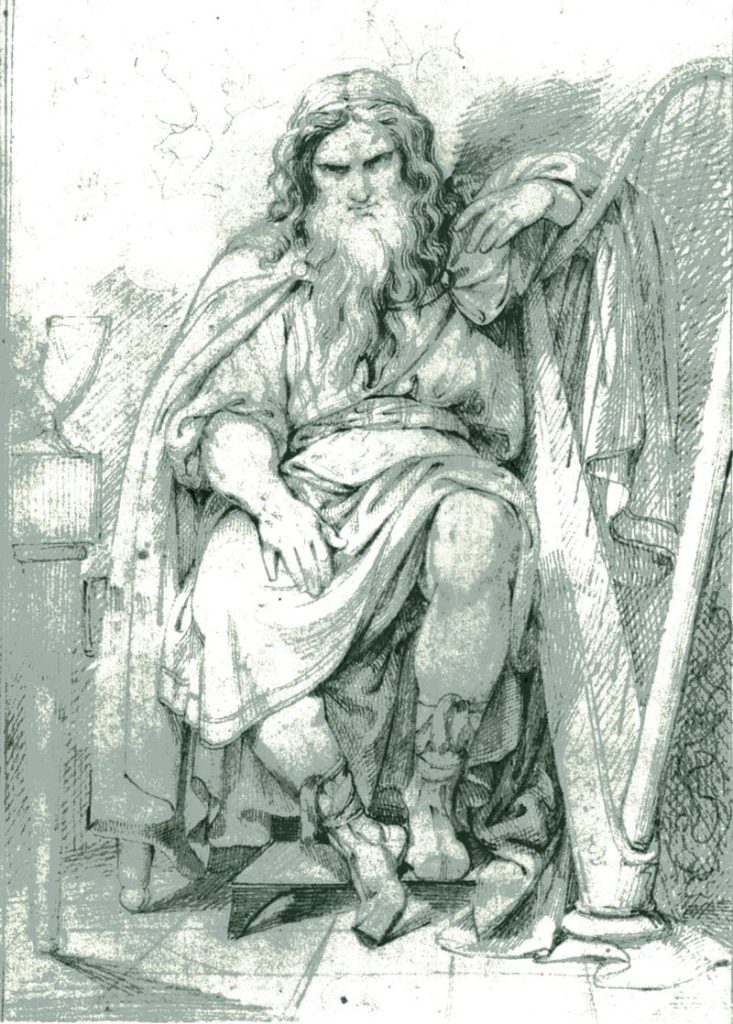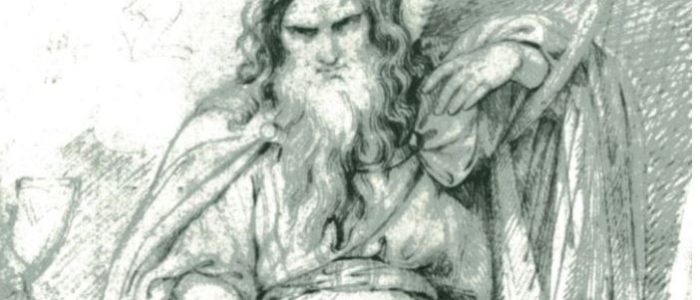Bragi is traditionally known as the god of poetry (or skáld) and music in Norse mythology. He was famous for his wisdom and mastery of words, not to mention for having the most extensive knowledge of poems and songs in the nine realms.
How Do You Pronounce Bragi?
Bragi means poet and originates from the word bragr, which means poetry. The pronunciation is bra-ghee, with the “r” pronounced as in French or German languages. The Vikings called male poets bragamen and female poets bragawoman.
Bragi as a theonym (or deity name) is most likely to originate from the Old Norse masculine noun bragr, translated as ‘poetry.’ In modern Icelandic, bragur means poem or melody in English. Other Old Norse-related words are bragnar (or chiefs) and bragningr (or king), so Bragi could come from either.
Bragarfull or a cup used when taking formal vows may also have some connection to the word. The Old English bregoi, meaning prince or lord, is another possible derivation.
Bragi often appears as a name in Old Swedish and Old Norse.
Bragi Family Background
Bragi was the son of the god Odin and, possibly, the giantess Gunnlod (or Gunnlǫð).
We know about Odin, but Gunnlǫð is also an important figure in Norse myth. She was a jötunn, responsible for the safety of the mead of poetry, which she guarded for her mother, Suttungr. Saturn’s moon, “Gunnlod,” is named after her.
The skaldic god was married to the goddess Idun (Iðunn) and they lived together in Asgard. Idun is familiar in Norse legend as the goddess of youth.
It is more accurate to say she was the keeper of the golden apples, which granted eternal youth to gods. This role was significant, considering Norse gods were mortal.
As Odin’s son, Bragi was also a half-brother to Thor, Baldr, Hodr, and Týr, the Norse god of War, Law, and Honor.
What Did Bragi Look Like?
Bragi had an exceptionally long beard associated with many Norse gods, but he is unique because he had runes tattooed on his tongue.
He is remembered as the first true skaldic poet and wrote such poignant and emotional verse that Odin named him the court poet in Valhalla after his death, believing that the finest warriors needed the finest poet and singer to tell their stories.
Most images of Bragi feature him playing the harp, a popular musical accompaniment when reciting poems in the past. In some symbolic depictions, the poet’s harp is next to a raven, a bird often associated with Odin.

What Were Bragi’s Powers?
He was famous for his wit and wisdom, and his astonishing talent with oratory and the written word were also well-renowned. He was the foremost expert on poetry or skaldship and the inspiration behind its other name, bragr.
Was Bragi Æsir or Vanir?
The Prose Edda of Snorri Sturluson described Bragi as a skaldic god and Odin’s son. These factors point to Bragi being one of the Æsir.
Was The God Bragi Actually Bragi Boddason?
Bragi is considered the first skaldic poet, although there have been many other poets in the Viking age called Bragi. The most famous was Bragi Boddason, who served several kings as a court poet, including Bjǫrn at Haugi, Ragnarr Loðbrók, and Eysteinn Beli.
Boddason wrote in the early 9th century and was the earliest recorded skald. He was known as Bragi the Old.
Some researchers do not consider the original Bragi a god at all and believe him to be the same person as Bragi Boddason. It seems that Boddason had been so good that Old Norse literary experts in the Middle Ages decided to portray him as a god of poetry, noting that the Old Norse word for poetry was bragr and claiming it was a direct derivation of his first name.
This admiration seems to have caused some confusion as there has never been any concrete evidence that the people of the nine realms ever worshipped him as a god.
For Snorri Sturluson (the author of the Prose Edda), there is a clear distinction between the Bragi, the god, and Boddason, the mere mortal skald, as he often mentions them separately.
The appearance of Bragi in the Lokasenna, a poem in the Poetic Edda describing verbal jousting (or “flyting”) between Loki and the gods, further suggests this separation.
Eugen Mogk and Sophus Bugge are just two scholars who debated in the 19th century whether Bragi was simply a literary deification of Boddason.
Bragi Mentions in Norse Mythology
Ragnarsdrápa
Sturluson quotes stanzas from Ragnarsdrápa, a poem thought to celebrate the legendary Viking Ragnar Lodbrok, otherwise known as Ragnar Lothbrok Sigurdsson (or “Hairy-breeches”). He describes the images depicted on an ornate shield Ragnar gave to Bragi.
The depictions included Thor’s fishing for the sea serpent Jörmungandr, the goddess Gefjun plowing Zealand (modern-day Denmark’s largest island) with soil from Sweden, Sorli and Hamdir’s attack on King Jörmunrekk, and the Germanic legend of the never-ending battle between Högni and Hedin.
The Grímnismál
The Grímnismál is a mythological poem in the Poetic Edda, narrated by a character called Grímnir, one of the many aliases of Odin.
It refers to Bragi in stanza 44, describing him as the finest of skalds.
Skáldskaparmál
A kenning (a metaphorical expression) from the Skáldskaparmál says he is a son of Odin. The poem does not reference his mother, although several works reveal her to be the giantess Gunnlǫð, daughter of Suttungr. She could also be Frigg, the Norse goddess of motherhood and fertility and wife of Odin.
The poem describes how Bragi sat next to Ægir, the Norse god of the sea, at a banquet when Ægir visited Ásgarðr, the home of the most important Norse gods (or Æsir). Bragi told the sea god stories about the Æsir, including the tale of Gunnlǫð (Bragi’s mother) and the mead of poetry.
The Poetic Edda
Bragi only appears on a handful of occasions in the Poetic Edda as he is one of the later gods in Norse history. However, as we have seen, he is more prominent in the Prose Edda. In Gylfaginning, Sturluson’s description of him is as follows:
One is called Bragi: he is renowned for wisdom, and most of all for fluency of speech and skill with words. He knows most of skaldship, and after him skaldship is called bragr, and from his name that one is called bragr-man or -woman, who possesses eloquence surpassing others, of women or of men.
Bragi | Pantheon Org
Lokasenna
The Eddic poem Lokasenna mentions how Bragi told Loki he would never have a place in the Æsir after killing Fimafeng, Ægir’s servant.
Loki, who Odin had banished, reminded his father of the blood oath they took, beguiling Odin into inviting him to join their drinking session. Odin ordered Víðarr to pour Loki a drink which led to an aggressive verbal exchange between Loki and Bragi, ending with Loki telling Bragi to back up his threats with action:
“Valiant on thy seat art thou, Bragi!
but so thou shouldst not be,
Bragi, the bench’s pride!
Go and fight,
if thou art angry;
a brave man sits not considering.”
Bragi | Facts, Information, and Mythology
Sigrdrífumál
Sigrdrífumál (translated as “victory-bringer’s tales,” also called Brynhildarljóð) is a section of the Poetic Edda text in the Codex Regius. It describes how Bragi’s tongue had runes carved upon it.
These runes were then removed, mixed with the mead of poetry, and sent to places for safe-keeping, among them the Æsir and Vanir.
Skáldatal
Skáldatal (or Catalogue of Poets) is a work of Old Norse preserved in two manuscripts. One of these, Codex Uppsaliensis, is one of the four principal manuscripts of the Prose Edda.
It features a list of Scandinavian court poets from legendary times to the late 13th century and mentions Bragi.
Eiríksmál
The poem Eiríksmál refers to Bragi asking Odin how he could be sure the rumors of the dead Norwegian king Eric Bloodaxe coming to visit Valhalla were true.
Hákonarmál
Odin sent Bragi and Hermóðr to meet Hákon The Good, who the Valkyrie Göndul had taken to Valhalla.
Literary Recommendations
John Lindow’s Norse Mythology: A Guide to the Gods, Heroes, Rituals, and Beliefs is an excellent source for more information on Bragi.

